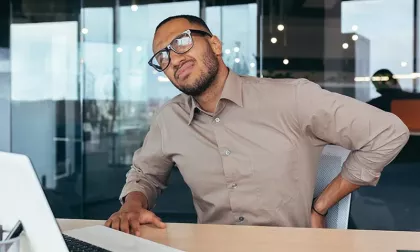How To Tell if Back Pain is Serious?

Back pain is one of the most common reasons people seek medical help or miss work. Fortunately, measures can help prevent or relieve most back pain episodes, especially for people younger than age 60.
Back pain is one of the most common reasons people seek medical help or miss work. Low-back pain is a very common problem in the United States and around the world. About 80 percent of adults have low-back pain at some point in their lives. It’s the most common cause of job-related disability.
Most episodes of low-back pain last only a short period of time and are referred to as acute low-back pain. In most cases, acute low-back pain goes away without causing any lasting problems.
Fortunately, measures can help prevent or relieve most back pain episodes, especially for people younger than age 60. If prevention fails, simple home treatment and using the body correctly often will heal the back within a few weeks. Low-back pain that lasts for 12 weeks or longer is referred to as chronic and should likely be addressed by a spine specialist.
Symptoms
Back pain can range from a muscle aching to a shooting, burning or stabbing sensation. Also, the pain can radiate down a leg. Bending, twisting, lifting, standing or walking can make it worse. Some other symptoms include:
- Increasing pain with lifting and bending.
- Worsening pain when resting, sitting, or standing.
- Back pain that comes and goes.
- Stiffness in the morning when awakening and lessened back pain with activity.
- Pain that radiates away from the back into the buttocks, leg, or hip.
- Numbness or weakness in your legs or feet.
When is back pain serious enough to see a doctor?
Most back pain gradually improves with home treatment and self-care, usually within a few weeks. Contact the experts at Southern Oregon Orthopedics for back pain that:
- Lasts longer than a few weeks.
- Is severe and doesn’t improve with rest.
- Spreads down one or both legs, especially if the pain goes below the knee.
- Causes weakness, numbness, or tingling in one or both legs.
- Is paired with unexplained weight loss.
In rare cases, back pain can signal a serious medical problem. Seek immediate care for back pain that:
- Causes new bowel or bladder problems.
- Is accompanied by a fever.
- Follows a fall, blow to the back or other injury.
What do doctors do to treat back pain?
The expert spine surgeons at Southern Oregon Orthopedics offer surgical and nonsurgical management of the full spectrum of spinal conditions. They use minimally invasive techniques whenever possible.
The board-certified surgeons at Southern Oregon Orthopedics always explore every available nonsurgical treatment before recommending surgery. If conservative approaches like physical therapy, yoga, acupuncture, and chiropractic care don’t alleviate your pain, they may recommend interventional pain management techniques like spinal injections or spinal cord stimulation.
If you are experiencing chronic back pain, contact the experts at Southern Oregon Orthopedics for a consultation today.